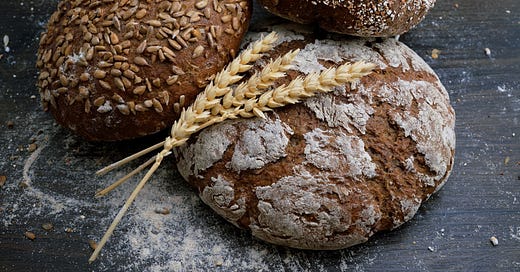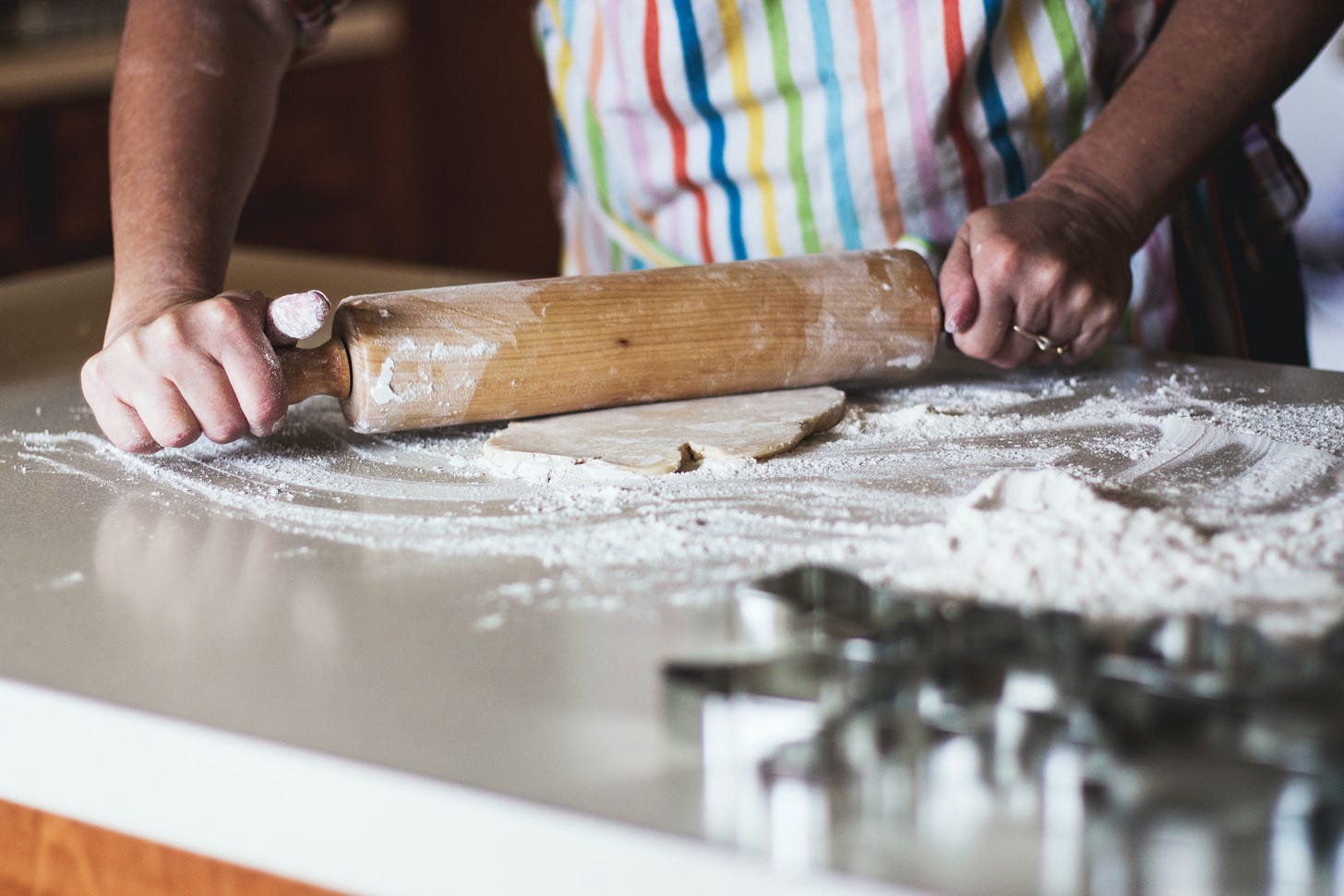From Professional to Patient: A Dietitian’s Celiac Story
Plus, tips from an expert on gluten-free eating & new audiobook from the editor!
Photo by Wesual Click on Unsplash
As a registered dietitian, I’m all too familiar with guiding others toward making food changes when a medical diagnosis requires lifestyle and dietary modifications. What I wasn’t familiar with (at the time) was making a major diet overhaul myself and how difficult making changes around our eating habits can be both emotionally and socially. This is my story.
Nine months after having my daughter I was sitting in an exam room, looking at the ceiling and waiting for my endocrinologist. I was exhausted and not because my thyroid levels were abnormal but because my daughter was still waking me up at night, pumping/nursing full-time was stressing me out and my workload was intense. I have no clue why during one of the most exhausting and stressful periods of my life that I even thought to ask about celiac screening. Maybe it was because my mom reminded me that my grandfather had celiac disease? Maybe I was looking for answers to why I just didn’t feel like myself? I didn’t have any obvious symptoms.
I could tell my endocrinologist was slightly skeptical about doing the screening. I had one reported grandparent with celiac disease, and all of my responses to his questions about possible symptoms were negative. He said he wasn’t sure if insurance would even cover the testing based on my responses. I felt embarrassed and even ashamed for even bringing it up. Yet, I told him to just run the screening.
I was in the middle of my work day counseling patients when I got the call from the endocrinology office that my celiac screening was positive and I needed to followup with a gastroenterologist.
I instantly regretted even bringing it up during my visit. Why? I love all things wheat. Artisan bread, pasta, crackers, baking with AP flour, malt milkshakes, croissants, and the list goes on. I never really cared about donuts or beer until I couldn’t partake.
Photo by Samee Anderson on Unsplash
It had to be a mistake.
It wasn’t. The upper endoscopy and biopsy with the gastroenterologist confirm that I had mild damage to my small intestines. I told my mom I was eating whatever I wanted after I turned 80.
The gastroenterologist gave me a handout on gluten-free eating. A strict gluten-free diet is the only treatment to manage celiac disease.
At that point in my thirteen year career I had provided dietary counsel to thousands of people with a variety of medical conditions. I had only counseled one person newly diagnosed with celiac disease. This is actually not uncommon for dietitians working with adult patients. Only about 1% of the U.S. population is estimated to have celiac disease, but it is estimated that up to 83% are undiagnosed or misdiagnosed.
Celiac disease is a genetic, autoimmune disease where eating gluten, a protein found in wheat, barley and rye, causes damage to the small intestine. It can go undetected for years especially in adults, like myself, because celiac disease impacts people in different ways. According to the Celiac Disease Foundation, there are more than 200 symptoms of celiac disease, which impact the digestive system and/or other parts of the body.
The World Gastroenterology Organization classifies celiac disease into two categories, classical and non-classical.
Classical celiac disease: Often individuals present with signs and symptoms of malabsorption, including diarrhea, steatorrhea, iron-deficiency anemia, weight loss or growth failure.
Non-Classical celiac disease: Often individuals present with non-specific gastrointestinal symptoms without signs of malabsorption.
Asymptomatic celiac disease occurs when individuals report no symptoms even on detailed questioning despite the presence of intestinal lesions and a positive diagnosis of celiac disease.
Undiagnosed celiac disease is a problem because untreated it can contribute to other medical issues like iron-deficiency anemia, osteoporosis, unexplained infertility, chronic fatigue, dermatological issues, among other issues.
It was incredibly disappointing to have to let go of the freedom to eat whatever I wanted and not have to worry about things like ingredient lists and cross-contamination. Speaking of disappointing, don’t get me started on how disgusting, dry and crumbly I think most gluten-free breads taste (that’s a rant for another newsletter).
Photo by Toni Osmundson on Unsplash
I am also aware of how lucky I was to receive the diagnosis for a diet-managed condition. It gave me more empathy for discussing changes with my clients. Food is such a part of our social lives and has deep cultural and familial ties for many. Feeling left out or having to make adjustments even for health reasons isn’t always easy. I’m glad I can relate on a more personal level to the struggles many have making food changes. Ultimately, I believe being the patient has made me a more compassionate professional.
My Favorite Celiac Tips from an RDN Expert
Photo by Brands&People on Unsplash
We live in a wheat-filled world with humans, not a great combination for someone with celiac disease.
Pam Cureton RDN, LDN Clinical & Research Dietitian
When I first was diagnosed with celiac disease, one of the best resources was my fellow RDN friend, Pam Cureton. I met and brunched with Pam prior to my celiac diagnosis when I could order anything on the menu. Pam has spent much of her career as a clinical and research dietitian working in the area of gluten-related disorders. She worked as part of the team with one of the world’s leading gastroenterologists on gluten-related disorders, Dr. Alessio Fasano, who has authored several books. Here are three things she shared with me that helped as I navigated my gluten-free diet:
Tip #1: Eating Out? Tell servers you have an allergy to wheat and NOT that you eat gluten-free.
Photo by Petr Sevcovic on Unsplash
People working in the food industry understand food allergies. Food allergies are serious and so is gluten-free eating for someone with celiac disease. While some individuals may follow a gluten-free diet for other reasons, it’s a medical reason for those managing celiac disease. It is easier to communicate the serious nature of menu substitutions or inquiring about ingredients with a server if they understand gluten-free is not merely a preference but a medical necessity. Is celiac disease an allergy to wheat? No, but we don’t need to discuss that it is an autoimmune disorder, we just need to order our meal. It is important to also follow-up with asking about specific ingredients like malt vinegar, soy sauce and a gluten-free dedicated fryer. If there still seems to be confusion after explaining your needs to your server and you don’t trust that your meal will be gluten-free go somewhere else. It has only happened once, but I did have to leave one restaurant because they weren’t able to make a simple request to ensure my meal was gluten-free.
#2: Love Baking? Buy America’s Test Kitchen Book: How Can It Be Gluten-Free
Photo by Kari Shea on Unsplash
I love cooking, but baking is my favorite. Gluten typically plays an important role in ensuring baked goods rise and provides a unique airy and chewy texture in breads. When you are baking with various gluten-free flours, it is important to understand which options might work best and why. Initially, when I tried baking with a 1:1 ratio gluten-free flour in some of my favorite recipes, they didn’t always turn out well. America’s Test Kitchen explains the why behind certain gluten-free ingredients, like xanthan gum for elasticity and stickiness, and how to ensure that your gluten-free baked goods are just as tasty as their gluten-containing counterparts.
#3: Use Reliable Resources
Photo by Kari Shea on Unsplash
There are so many resources when you google gluten-free eating but not all sources provide accurate information. Beyond Celiac Disease, Celiac Disease Foundation and the Gluten-Intolerance Group are some of the best sources for getting started with information on celiac disease and gluten-free eating.
Do you have celiac disease? What are some of your favorite resources?
New Audio Book Released by The Well Editor!
Ari's novel, The Moral Tango, about 30-year-old Lisa Mandel stumbling and finding her way with career, friends, and love, is now available as an audiobook! Hear all the characters in Lisa's world come to life with talented narrator Rebecca Minor. Congratulations, Ari!
Click this link to download her audiobook.











